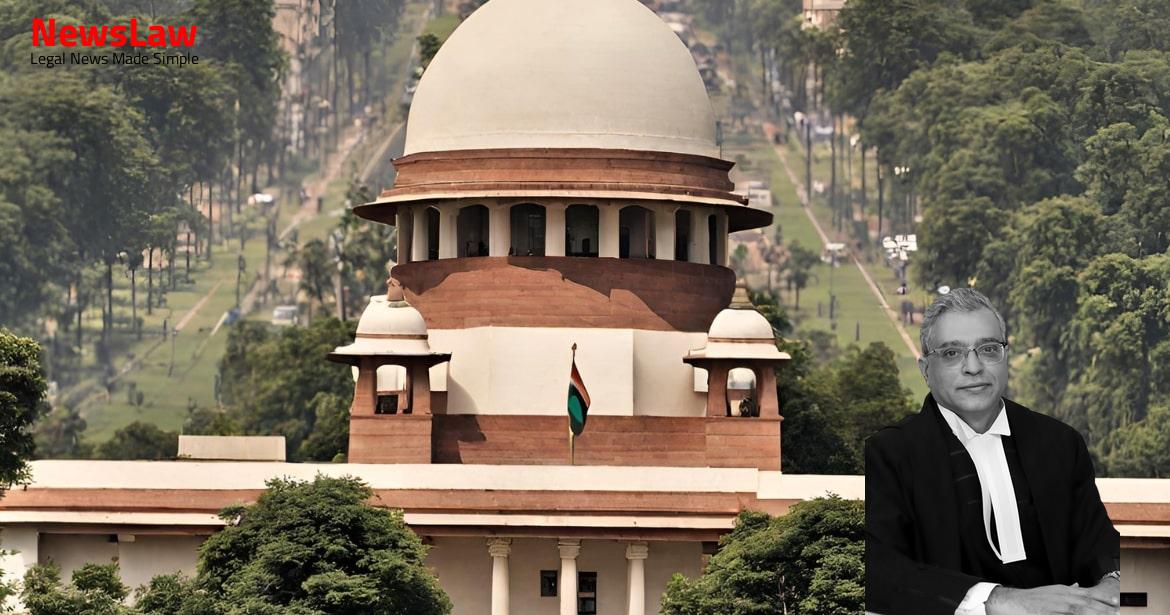Explore the nuanced legal analysis conducted by the court on inter-State sales in import transactions. The case delves into the application of taxation laws, particularly the Central Sales Tax Act, to determine the tax liability on goods imported into India. Understanding the interpretation of ‘sale in the course of import’ is crucial in avoiding double taxation and ensuring compliance with legal requirements. Stay tuned to unravel the complexities of this legal scenario.
Facts
- The transactions involved in the appeal were for the supply of timber from a foreign country in a similar fashion.
- The appellant challenged the decision of the High Court through these appeals on various grounds.
- The appellant transferred goods to the end-buyer while they were on high seas by endorsing the bill of lading.
- The appellant claimed that the transactions were covered by Section 5(2) of the CST Act and provided seven documents to support this claim.
- Seven transactions of similar nature were the subject matter of the appeals, with one relating to the assessment for 2005-06 and the others for 2006-07.
- The CTO denied the exemption to the appellant in the assessment orders, stating that the appellant cleared goods from customs after filing bills of entry and later raised debit notes to show sales to end-buyers.
- Upon reaching the port at Visakhapatnam, the appellant followed the procedures under the Customs Act, 1962, by filing a bill of entry for warehousing and another for home consumption (ex-bond).
- The High Court upheld the assessment orders passed by the Commercial Tax Officer, determining the transactions as inter-State sales liable to Central Sales Tax, and denied the exemption claimed under Section 5(2) of the CST Act.
- The appellant, M/s. Vellanki Frame Works, a sole proprietary concern, is engaged in the business of sale and purchase of timber and imports timber from other countries.
- The CTO disallowed the exemptions claimed by the appellant on a turnover of Rs. 1,14,86,342.
- The transactions were treated as inter-State sales falling under Section 3(a) of the CST Act in the assessment.
- The balance tax amounting to Rs. 14,35,793/- was held payable by the appellant.
- The High Court mentioned the doubts expressed by the assessing officer regarding the existence of some dealers.
- The availability of C-Forms to the appellant relied on the existence of the mentioned dealers.
Also Read: Legal Analysis in Joint Trials Error
Issue
- The principal issue in the appeals is whether the sales occurred during the import of goods into India.
- The key question is whether these sales qualify for exemption under Section 5(2) of the CST Act.
Also Read: Dismissal of Contempt Petition: Legal Analysis
Arguments
- The respondent’s counsel argued that, based on the agreements and bill of entry filed by the appellant, the High Court’s conclusion that the appellant was the sole importer was justified.
- It was emphasized that the import process was completed solely through the appellant, with Radha not involved until after the goods had crossed the Indian customs frontiers.
- Reference was made to the case of Sampat Raj Dugar to analyze its implications on the present case.
- The appellant’s submission regarding the agency nature of the transaction, as evidenced by agreements and accounting records, was countered by the respondent as not changing the fact of the appellant being considered the importer.
- The transfer of imported goods by the appellant to Radha before bonding with customs authorities did not change the characterization of the transaction as an inter-State sale.
- It was argued that the delivery and movement of goods from Visakhapatnam to Lucknow constituted an inter-State sale, leading to the appellant being rightfully held liable for tax.
- The appellant argued that the definition of importer in the Customs Act indicates the person in possession of goods at the time of filing the bill of entry but does not indicate ownership.
- Ownership of goods is determined under the Sale of Goods Act, not the Customs Act.
- The appellant contended that the sale in question, being a ‘sale in the course of import,’ is not taxable under the CST Act.
- The appellant’s counsel referenced various agreements and the sequence of events to establish the transfer of title before the goods crossed the customs frontiers of India.
- The quadripartite agreement specified Radha as the final buyer of the goods, indicating privity of contract between the seller and the buyer.
- The appellant emphasized that the agency agreement played no role in the import transaction.
Also Read: Legal Analysis on Goods Confiscation and Penalties
Analysis
- The High Court analyzed the inclusive definition of ‘importer’ in the Customs Act and concluded that the person who filed the bill of entry remains the importer until the goods are cleared for home consumption.
- It was observed that the expanded definition of ‘importer’ cannot override the identity of the person who filed the bill of entry.
- The Court emphasized that the appellant was considered the importer of the goods since the bill of entry showed they had been cleared for home consumption.
- The sale of goods in the course of import journey was discussed with reference to the transfer of shipping documents while the goods were afloat.
- The Court found that the sale of goods took place in the course of the import when the property of the goods passed during the import journey.
- The High Court highlighted the importance of avoiding double taxation on goods, which could negatively impact foreign trade.
- The analysis of the terms of the contract to determine the passing of property in the goods was a crucial aspect of the judgment.
- Several cases, including J.V. Gokal & Co., were referenced to understand the legal position of import sales and the transfer of goods through shipping documents.
- Section 5 of the CST Act outlines the principles for determining when a sale or purchase of goods takes place in the course of import or export.
- Sub-section (2) of Section 5 specifies that a sale or purchase of goods is deemed to take place in the course of import if the sale either occasions such import or if there is a transfer of documents of title to the goods before crossing the customs frontiers of India.
- Explanation 1 clarifies that the movement of goods starts when delivered to a carrier and ends when taken from the carrier.
- Explanation 2 states that if the movement of goods starts and ends in the same state, it is not considered a movement from one state to another even if passing through the territory of another state.
- Parliament has the authority to formulate principles for determining when a sale or purchase of goods takes place in various ways mentioned in the law.
- The Central Sales Tax Act, 1956, enacted by Parliament under its powers, further defines when a sale or purchase is deemed to take place in the course of inter-State trade or commerce.
- Section 3 of the CST Act specifies conditions under which a sale or purchase is considered to be in the course of inter-State trade or commerce, such as occasions the movement of goods from one state to another or involves a transfer of title documents during their movement between states.
- The definition of ‘sale’ in the context of the CST Act includes various forms of transfers of property in goods for consideration.
- Article 286 of the Constitution details restrictions on the imposition of taxes on the sale or purchase of goods by states, preventing duplication or oppressive taxation.
- The claimed exemption under Section 5(2) of the CST Act was rightly denied to the appellant.
- The High Court dismissed the writ petitions filed by the appellant.
- The High Court allowed the appellant time to submit C-Forms for availing the benefit of concessional tax rate.
- No grounds for interference have been found.
- The appellant has deposited Rs. 7,07,325 with the respondent, which can be adjusted against the appellant’s dues.
- The attempts by the appellant to avail the exemption were rightly disapproved by the CTO and the High Court.
Decision
- The miscellaneous petitions pending will be automatically dismissed.
- If the petitioner produces C-Forms within three months, they will be given the benefit of a concessional rate of tax.
- The petitioner has three months from today to produce the prescribed C-Forms.
- The appeals have failed and are dismissed with costs.
Case Title: M/S. VELLANKI FRAME WORKS Vs. COMMERCIAL TAX OFFICER (2021 INSC 20)
Case Number: C.A. No.-001322-001323 / 2019



